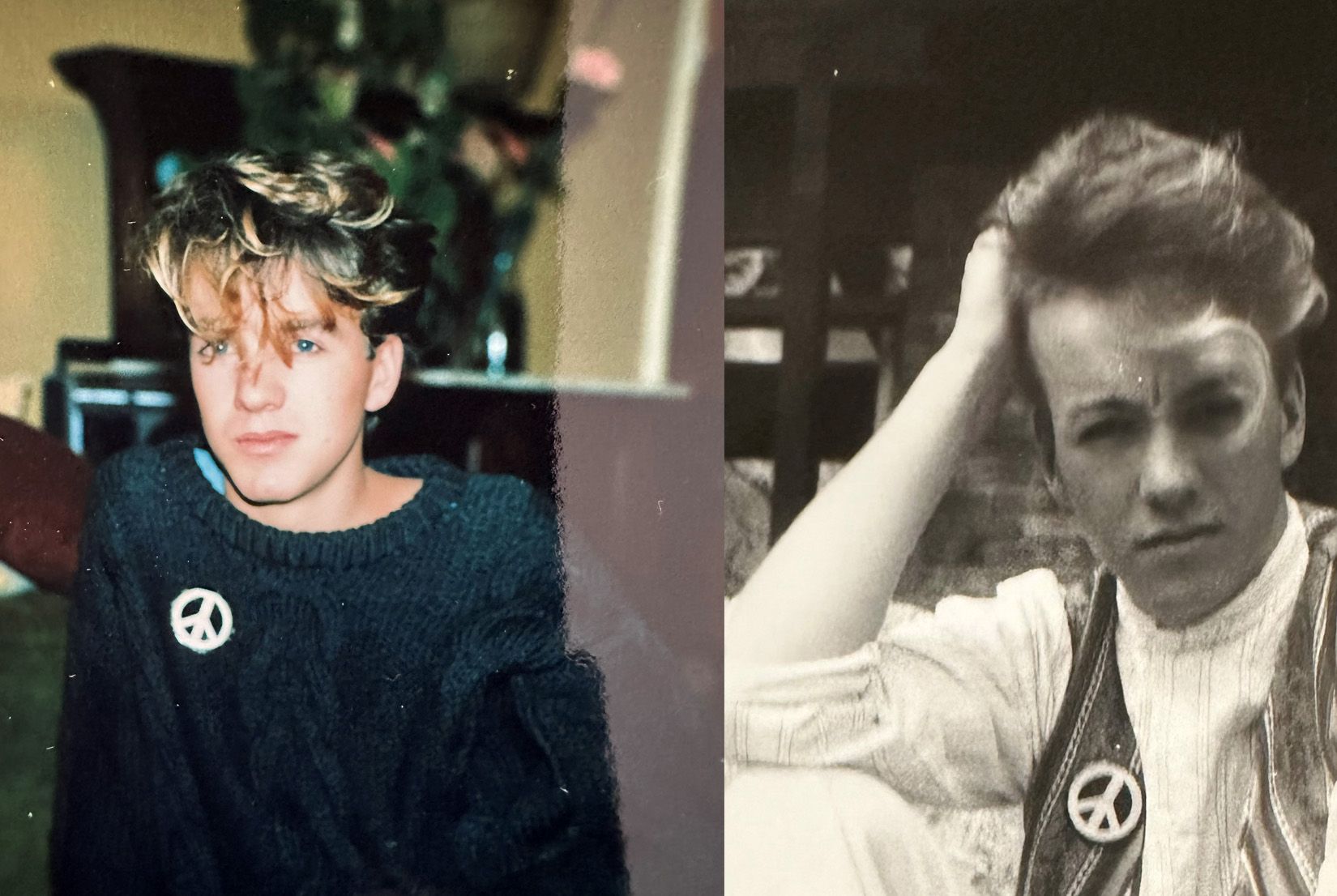As the first boy at school to dye his hair, or as the only male at a gender studies conference, Professor Michael Flood is long used to being the odd man out.
Over more than three decades, Professor Flood, of QUT’s School of Justice, has been drawn to issues involving gender equality, feminism, domestic and sexual violence, raising boys and what it means to be a man.
His extensive work in these fields – first as an educator and advocate, then academic - has put the notion of ‘healthy masculinities’ on the national and international agenda. He has also been instrumental, first in the ‘why’ and now the ‘how’, of engaging men and boys in building gender equity, addressing and preventing violence, and establishing healthier lives.
“These days, it’s slightly more normal to encounter men who do pro-feminist advocacy and gender issues but in the late 1980s and 1990s, it was relatively rare,’’ Professor Flood said.
“I was the first one at my school to dye my hair and I wore earrings and was perceived as gay - which I’m not - but I long had some sense of distance from traditional masculinity.’’
As a widely published author and thought-leader in this sphere, Professor Flood has driven national and international development of policy and programming, with his research informing violence prevention frameworks, initiatives to engage men, and community-based promotion of healthy masculinities.
Among many achievements, he published the first Australian research on the extent of children’s exposure to pornography; gave expert testimony to the Royal Commission into Family Violence and Fair Work Commission hearings on domestic violence leave; and his research informs national anti-domestic violence charity White Ribbon.
Within a current Australian Research Council (ARC) grant he is examining men’s pathways into, and participation in, anti-women online movements, known as the “manosphere’’.
A high-achieving family
As the middle child of three siblings, Professor Flood grew up in a high-achieving family.
He grew up with an “activist bent’’, a trait he says he shares with his brother, Adrian, a journalist, and sister, Nadine, a former national secretary of the Community and Public Sector Union (CPSU).
His father, Philip Flood, is a retired high-level diplomat and senior public servant, with roles including Secretary of the Australian Department of Foreign Affairs and Trade, High Commissioner to the United Kingdom, High Commissioner to Bangladesh, Australia’s Ambassador to Indonesia, and in the Australian Embassy in the United States.
Professor Flood’s mother, Josephine Flood (nee Scarr) is an English-born Australian archaeologist who studied at Cambridge University and Australian National University, specialising in Aboriginal rock art.
She was also a mountaineer who, in the early 1960s, scaled six previously unclimbed 20,000 feet-plus mountains in Nepal, writing a book of her adventures titled Four Miles High.
Due to his father’s diplomatic postings, Professor Flood was born in Paris where he lived until he was two. The family returned to Australia for two years, then moved to Bangladesh, followed by a posting in the US, before again returning to Australia when Professor Flood was nine.
He attended Canberra’s Deakin High School but was “ripped out’’ in grade eight by his parents to attend Canberra Grammar School because “they felt I was not learning much, and I was spending too much time chasing girls’’, (both of which were true, he says.)




Student activism
Professor Flood completed a Bachelor of Arts (Honours) in Sociology and a PhD in Gender and Sexuality Studies at the Australian National University.
He was drawn to left-wing student politics, becoming involved in anti-nuclear activism, and joining an anti-sexist men’s group when he was 20.
“Feminist women were the backbone of the group I was involved in on campus,’’ Professor Flood said.
“I was going out with feminist women and being challenged on my sexism and learning about these issues.
“The men’s group engaged in anti-sexist consciousness raising – we talked about fathering, violence, bullying, body image, sexism, all kinds of stuff.’’
From this foundation, Professor Flood moved to other forms of anti-sexist activism, including against sexual assault.
He wrote a “notorious’’ column for the student newspaper about men, gender and sexuality called Wet Patch and, in 1990, started a pro-feminist printed magazine, XY, that is now a significant online resource (xyonline.net), registering up to about 13,000 unique visitors a month. (It’s small in terms of popular websites, Professor Flood says. “I mean, Pornhub would get many thousands more’’).
“I’ve had a fascination with these areas for a long time,’’ he said.
“There’s research on the factors that shape men’s trajectories to pro-feminism or interest in gender issues. Certainly, one is being exposed to violence in their own life or in the family. That wasn’t my case, I had a happy childhood.’’
Rather, Professor Flood says his career path has been driven by political and ethical principle, as well as learning from former girlfriends who’d suffered violence from ex-boyfriends or other men.
“My sense of ethics and principles, of wanting to be a good person, I think that came from my family,’’ Professor Flood said.
“My brother and sister and I are all social change advocates of various kinds. We all share it.’’




Changing the conversation
Over the decades, community intolerance of domestic and sexual violence has grown and now sits firmly on the public agenda.
In recent years, there have been terrible stories of rape and violence and murder that have captured the nation’s attention - victims like Rosie Batty (whose son Luke was murdered by his father), Jill Meagher (raped and murdered while walking home in Melbourne) and Hannah Clarke (murdered in a petrol fire in her car with her three young children).
But Professor Flood does not believe individual incidents alone have propelled domestic and sexual violence onto the agenda.
Rather, it’s due to grassroots advocacy and calling out these crimes as public issues to care about.
“Advocacy has shifted community attitudes, driven policy attention and led to the provision of services and responses for victims and survivors,’’ he said.
“I wouldn’t say I’ve led violence prevention in Australia, but I’ve made key contributions to primary prevention and in driving and shaping efforts to engage men and boys.’’
Professor Flood is currently working on “the third key benchmark of progress in Australia’’ in the form of the Perpetration Project – a national survey collecting information on perpetrators. It follows other national surveys - the Personal Safety Survey on violence victimisation, and the National Community Attitudes Survey about people’s attitudes towards domestic and sexual violence.
And it’s why when we talk about Rosie Batty or Jill Meagher or Hannah Clarke, Professor Flood will also mention the perpetrators of these horrific crimes - Greg Anderson, Adrian Bayley and Rowan Baxter.
“At the moment, we know very little about the people using violence,’’ Professor Flood said.
“I like mentioning the perpetrators because it’s important to shift public conversations about domestic and sexual violence to bring the perpetrators into the picture and to seek to hold them accountable.’’
The dark side
As a pro-feminist in the public sphere, Professor Flood says there is always an “energetic backlash’’ against any feminist efforts and he has received threats to him and his family and faced attempts to have him fired from his job.
“I have had death threats from men’s rights groups, phone calls from father’s rights and men’s rights advocates,’’ Professor Flood said.
But none of it will stop his passion for working in this field.
“This is my driving passion, and I would do it, paid or not,’’ he said.
“It sounds trite, but it is empowering and inspiring to have a sense of purpose and I feel absolutely committed to this.’’
Read Professor Michael Flood's latest article about modern masculinity in The Conversation
Aligned with the United Nations Sustainable Development Goals
In 2015, UN member states agreed to 17 global Sustainable Development Goals (SDGs) to end poverty, protect the planet and ensure prosperity for all.
Latest stories
6 May 2024
What does the new Commonwealth Prac Payment mean for students?
The federal government has announced a Commonwealth Prac Payment to support selected groups of students doing mandatory work placements. Will it do enough to end ‘placement poverty’?
Read more of What does the new Commonwealth Prac Payment mean for students?
29 April 2024
Half our colleagues suffer pain at work, but periods are still a taboo subject
While employees would probably tell their boss about a stomach upset, many who menstruate and feel unwell as a consequence every month, are unlikely to talk about their difficult periods.
Read more of Half our colleagues suffer pain at work, but periods are still a taboo subject
10 April 2024
Supermarkets need to change the way they operate in Australia
Australia’s big supermarkets have been put on notice. A Treasury-commissioned review recommends making the existing voluntary food and grocery code of conduct mandatory. But will this be enough to change the way supermarkets operate in Australia?
Read more of Supermarkets need to change the way they operate in Australia


